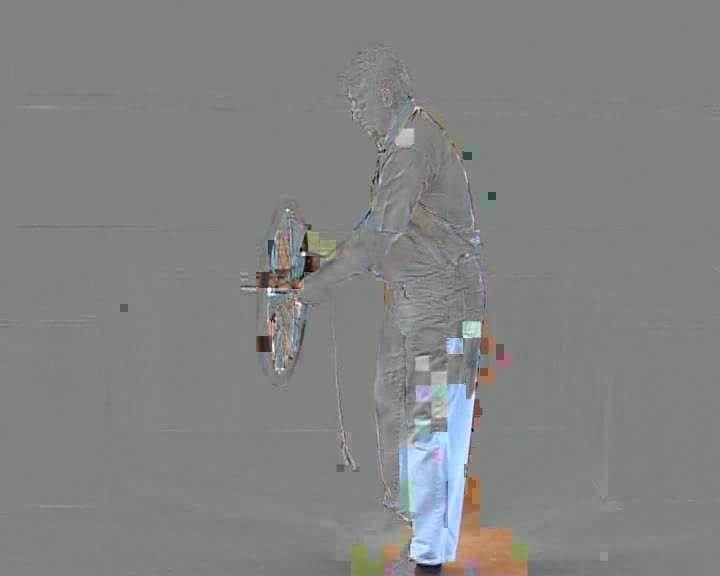„Perdület megmaradás V.” változatai közötti eltérés
| 8. sor: | 8. sor: | ||
== Kísérleti elrendezés== | == Kísérleti elrendezés== | ||
A biciklikerék tehetetlenségi nyomatékát úgy növeltük meg, hogy a gumi alá acélhuzalt tekercseltünk. | A biciklikerék tehetetlenségi nyomatékát úgy növeltük meg, hogy a gumi alá acélhuzalt tekercseltünk. | ||
| + | |||
| + | = Conservation of an angular momentum V. = | ||
== English text == | == English text == | ||
A lap 2013. április 18., 12:56-kori változata
Az elhangzó szöveg
Ha a nem forgó biciklikereket a tengelyének végénél fogva felfüggesztjük, akkor a lengések lecsillapodása utáni helyzeten nincs mit csodálkozni. Ismételjük meg a kísérletet forgó biciklikerékkel! Ekkor meglepő látványban lesz részünk, a biciklikerék precesszálni kezd a függőleges tengely körül. A biciklikerék perdületvektorára merőleges forgatónyomaték csak a perdület irányát változtatja meg – ez eredményezi a precessziós forgást. Forgassuk meg a biciklikereket ellenkező irányba, a precesszió iránya is ellenkező lesz.
Kísérleti elrendezés
A biciklikerék tehetetlenségi nyomatékát úgy növeltük meg, hogy a gumi alá acélhuzalt tekercseltünk.
Conservation of an angular momentum V.
English text
If the stationary bicycle wheel is hanged by the end if its axis there is nothing to wonder about the situation after the attenuation of swinging. Let us repeat the experiment with rotating bicycle wheel. In this case there will be a surprise: the bicycle wheel will start precessing around vertical axis. The torque perpendicular to the angular momentum vector can change only the direction of the angular momentum – this will lead to the precession. If we turn the bicycle wheel in the opposite direction the direction of the precession will also be change in the opposite.
